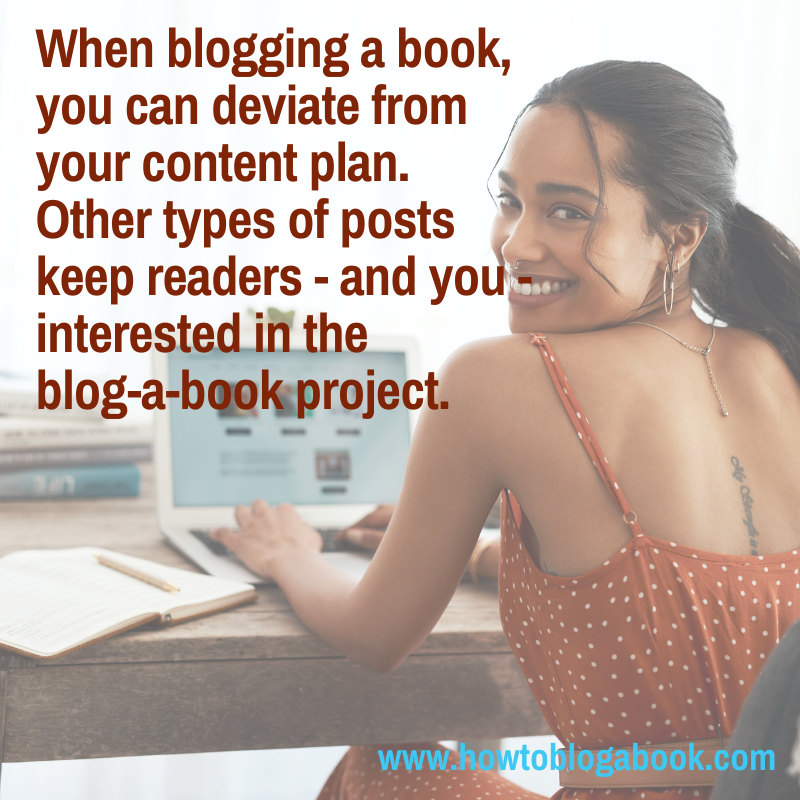Before you blog your book, you need to develop a content plan. Your blog-a-book content plan helps you identify your chapters and the blog posts necessary to write the book. But just because you’ve laid out your blogging plan doesn’t mean there can’t be flexibility in your writing schedule.
Sometimes you may not be in the mood to write one of the topics from your blog-a-book plan. Rather than losing your writing momentum, how about using one of the following content ideas to maintain your blogging consistency?
Blog Content Ideas
These suggestions will help you leverage your current blogging activity. Plus, they will provide useful content to your readers when you aren’t writing blog posts intended for your book.
1. Book Reviews
Before you developed your content plan, you hopefully did some competitive research on published books within your niche. Reading these competitive books helps you determine the topics you want to include in your book and the writing style and content layout to adopt. Take notes for each book you read, and use these to write a book review blog post.
Tips for writing a useful book review:
- Include key information, like title, author, and website link, to make it easy for your readers to explore a book further. You can also include buy links, and even better if you’re an Amazon affiliate.
- You may leverage the book’s blurb to write a book summary in your own words. Your recap should give your readers a general idea of the book’s premise.
You don’t have to write long, in-depth book reviews, but the post needs to add value. There’s no point in publishing a book review that is just a cut and paste of the book’s Amazon description.
Look at the topic covered from your unique point of view, and share thoughtful and insightful insights that help your readers determine whether the book is relevant to them.
The ideal time to publish these book reviews is when you have written and published related posts. Then you can add a hyperlink to direct readers from your book review to relevant posts on your blog.
2. Book Club Discussion Points
Some nonfiction books include sample book club questions and discussion points, but this feature is more prevalent in fiction. Close this disparity by creating a set of book club questions for every nonfiction book you read within your niche. Click here for some sample nonfiction book club questions to give you some inspiration to create your list.
When you publish your book, don’t forget to add a personalized set of book club questions at the end. I belong to a nonfiction book club. Even though we don’t always answer every question, the list is a valuable jumping-off point to kick-start our group discussions.
3. Book Lists
You may have amassed a list of books during your competitive research or gathered them during your blogging activities. If so, a book list is an easy way to pull together a blog post when you’re short on time. The benefit of this type of blog post is that it’s a short, easy read.
During social interactions and reading other blogs, you’ll also come across other bloggers’ book recommendations. Even if you haven’t read the book, you can add it to your recommendations list and link to the thought leader who recommended it.
4. Author Interviews
Interviews are ideal for getting somebody else to write content for your blog, but this strategy requires content management. First, you have to solicit and approach authors and encourage them to contribute. Then, you usually have to remind them about the publishing deadline. Finally, when you receive their content, you need to proof (and sometimes edit) before publishing it.
I host an author interview series of bloggers who have written a travel-related book. I pose the same list of questions to every author, just like the success stories on this blog. I like the consistency of this approach; it keeps things simple for my readers and me. Of course, depending on your niche and the authors, you may have to personalize some questions.
When hosting author interviews, set up a simple system to track the authors in the content cycle (e.g., contacted, agreed to contribute, content due date, reminder sent, and publication). I used Trello to track and set reminders, but you could just as easily set up an excel spreadsheet.
5. Discussion Post about Key Topics
Your blog-a-book plan will include a list of posts. Each one should have one key theme to help your readers consume your content without feeling overwhelmed. But sometimes, you’ll write about specific topics that would make excellent discussion posts.
Maybe you’re struggling with your point of view on a specific topic or want to present a balanced argument on critical topics. You feel the need for contributions or ideas to flesh out your content. Create a blog post that summarizes the discussion, and include links to related articles on your blog. These posts are ideal for sharing on social media to gather attention and direct traffic back to your blog.
Ideally, you want to leverage the blog commenting section of your post. But if you get responses on social media, ask the poster if you can add the content to your post as a contribution.
Even if you have a clear idea of your book’s content scope, it’s still good to keep an open mind to what others say on key topics. You may even be surprised by a point of view you hadn’t previously considered that could improve your book.
6. Inspiration and Quotes
Visual posts are ideal, especially if you’re using Pinterest to share your blog posts. However, if you want to keep it simple, use Canva to create an image and quote related to your niche or that you think would apply to your audience. Then share it on Pinterest, so it links back to your source blog post.
You can beef us your blog post content by adding links to other blog posts you’ve written that are related to the quote. For example, if I shared this inspirational quote, “To travel is to take a journey into yourself” (Danny Kaye), I could link to my posts that share travel stories about the emotional impact a location had on me.
Blog Content Ideas
You can start drafting these supplementary blog posts and keep them as works-in-progress. Then, when you’re struggling to create your book content, you have an almost-done post in reserve. The best strategy for blogging is consistency, and the content ideas shared above will help keep your blogging schedule on track and add variety for both you and your readers.
Make sure you have a good foundation of published blog posts that are part of or related to your blog-a-book project. That strategy provides you with plenty of options for adding related content links in any of the types of blog posts mentioned in this post.
What type of blog posts do you write when you’re not in the mood to blog your book? Share your ideas and suggestions in the comments below.
About the Author

Jay Artale abandoned her corporate career to become a digital nomad and full-time writer. She’s an avid blogger and a nonfiction author helping travel writers and travel bloggers achieve their self-publishing goals. Join her at Birds of a Feather Press where she shares tips, advice, and inspiration to writers with an independent spirit.

Leave a Reply